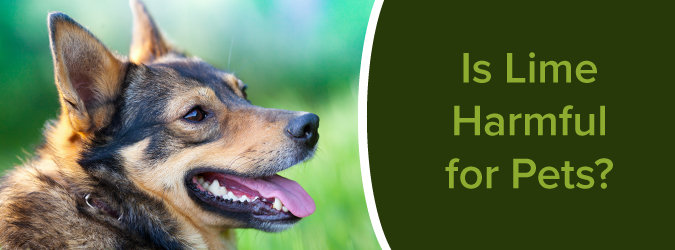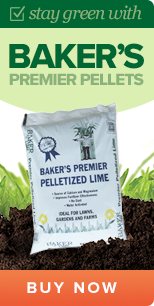Is Lime Harmful For Pets?
Table of Contents
Author/Reviewed By: Josh Miller, Sales Manager: Baker Lime & North America Minerals
Published: 8/17/2017 – Updated: 10/25/2023
Lime fertilizer is used by homeowners to keep lawns in tip-top shape. This mineral substance is made from ground limestone, a soft, high-calcium rock, and works to raise the pH of acidic soil, making the ground more hospitable to grass — promoting a thick and healthy yard with plenty of nutrients.
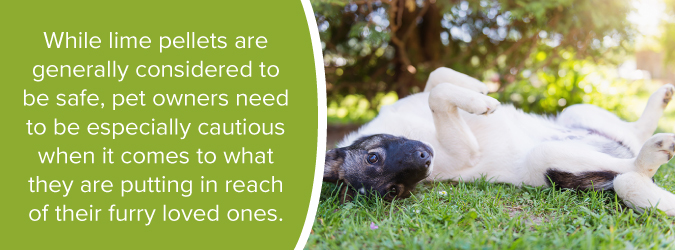
While lime pellets are generally considered to be safe, pet owners need to be especially cautious when it comes to what they are putting in reach of their furry loved ones.
Here are some safety tips for pet owners that will help you keep your dog safe and healthy, while still enjoying a green and luscious lawn.
Lime, What Is It?
Lime is made from ground limestone, a soft rock with high calcium content. Lime is a rather versatile material, used in everything from metalworking to construction. However, lime’s primary function is as a fertilizer.
Lime is added to soil to decrease its acidity. Acidic soil keeps many plants — including grass, fruits and vegetables from getting the nutrients they need to thrive.
Across the country, soil pH levels vary; 3.0 or below is considered very acidic, while 8.0 and above is considered basic.
The soil sweet spot is somewhere between 5.5 and 6.5 on the pH scale, though some plants thrive outside of the norm. Before you dive in, you’ll need to know what pH level best suits the garden of your dreams. If you’re after a green lawn without any bald spots — somewhere around 6.2 is just perfect.
Now, you’ll want to get your soil tested before applying lime blindly. You can purchase a soil testing kit online or from home and garden stores, but it’s hard to know how much lime you’ll need to add.
Find and contact your local Baker Lime dealer today!
Different Types of Lime
While lime, in general, applies to ground limestone, there are some different options — each designed for a particular use. Between quick lime and Ag lime, pelletized lime and loose powder, we’ll quickly dust over the different varieties and which ones work best for your needs.
Caustic Lime
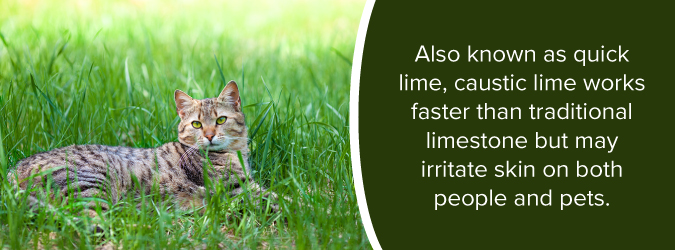
Also known as quick lime, caustic lime works faster than traditional limestone but may irritate skin on both people and pets. While quick lime can take soil from acid to base in short order, it may not be the best option for pet owners.
Hydrated lime is a particular version of quick lime with water added. Hydrated lime comes with a higher risk of chemical burns and needs to be applied more often than powdered and pelletized limes. Both hydrated and quick limes pose a greater risk of irritation and can also be messy and difficult to use.
Non-Caustic Lime
This type of lime is made from either dolomite or calcium, depending on your region. At Baker Lime, our limes are dolomitic — sourced from Central Pennsylvania. In any case, powdered non-caustic limes are used for commercial applications such as farming or for maintaining large areas of grass.
While broadly speaking, non-caustic limes, or “ag limes” are considered non-toxic for people, pets and the wildlife passing through, non-toxic does equate to a substance being 100% safe. Non-toxic literally refers to a material as not causing death or serious illness.
So, while lime likely won’t cause your dog to become seriously ill, it’s not a good idea to spread pellets and then let your dog run free.
Lime dust, in any form, may cause lung, skin and eye irritation, and it should be fully integrated into the soil before anyone — human or animal should use the lawn.
The main benefit of using lime powder is the nutrient delivery is much quicker and more precise than using lime pellets. The downside is handling large quantities of unwieldy powder may make a mess of your yard — leaving dust and residue in areas your pet uses regularly.
Lime Pellets
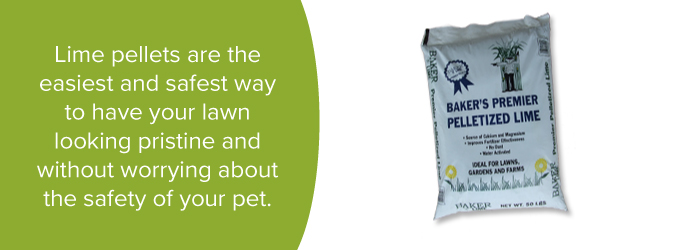
Lime pellets are the easiest and safest way to have your lawn looking pristine and without worrying about the safety of your pet. In most cases, lime pellets work well for homeowners with modest yards who’d rather spend minimal time covering their tracks after application.
In pellet form, it’s more difficult to finely tune the amount of product you’re applying to the area, but most people tend to find more pros than cons in the world of lime pellets.
Is Lime Harmful to Animals?
Safety is relative. Lime, in general, isn’t inherently toxic. However, the answer to the question is lime detrimental to dogs, is complicated.
In the grand scheme of things, lime pellets are about as safe for your furry friends as they are for you and the rest of your human family. But, it’s important to remember, if your dog plays outside in areas treated with lime, they may be at risk of coming into contact with the substance — which might cause some problems like lime poisoning in dogs.
Is Lime Safe For Dogs?
Over time, lime is absorbed into the ground. Once it has been fully absorbed, dogs can run free without too many risks. But, playing outside before the pellets or powder while lime powder remains undissolved can be harmful to dogs.
Because lime’s sole purpose is to increase the pH of acidic soil, it’s an incredibly alkaline substance. Lime’s alkalinity means that when pellets make contact with skin (human or animal), it can cause some serious irritation.
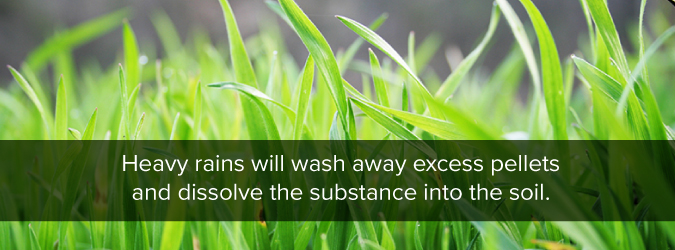
If possible, you’ll want to wait for a big rain to come, before allowing your pet to roam freely in the backyard. Heavy rains will wash away excess pellets and dissolve the substance into the soil, but waiting around for weather to get things done may not be the best option for everyone.
If you live in a dry climate or are applying lime during the summer, you’ll have to take matters into your own hands.
Watering thoroughly after the job is done is essential. Lime may pose some dangers to pets sniffing around the yard. Pulverized lime is dusty, so even if you go with pellets, there is sure to be some residue here and there which can harm pets.
Again, lime is widely considered to be non-toxic, accidentally consuming or breathing it in may cause some problems. Your pet is getting a calcium overdose — it won’t be comfortable, but chances are, with proper care, your favorite fur ball will pull through.
Watering does a good job reducing the risk of inhalation, or ingestion, as it eliminates anything you might’ve missed.
Does Lime Hurt Pets?
Once your soil has fully absorbed the lime, your pet can run free without significant risks. However, playing outside before the pellets or powder dissolves can harm dogs. While lime is widely considered nontoxic, accidentally consuming or breathing it in may cause problems. If possible, you’ll want to wait for a big rain to come before allowing your pet to roam freely in the backyard. Heavy rains will wash away excess pellets and dissolve the substance into the soil, but waiting around for weather to get things done may not be the best option for everyone.
What Are the Actual Hazards?
Pets mostly face the same lime hazards we do with powdered lime — pellets can be safer. Below, we’ll outline some of the biggest risks pets face when they come into contact with lime fertilizer, as well as what you can do to help your favorite critters if they get mixed up in something that might hurt them.
Hypercalcemia?
Hypercalcemia can best be described as an excess of calcium in the blood — but it can be toxic to all the body’s tissues, as well as the kidneys, cardiovascular and nervous systems.
Side effects include nausea, vomiting, constipation, and a decreased function in the gastrointestinal tract. Additionally, your pet may experience some loss of muscle function — think spasms, seizures, depression and general weakness. In more extreme cases, hypercalcemia may cause hemorrhaging, internal bleeding and loss of appetite.
Hypercalcemia may not be extremely dangerous, at least not right off the bat, but it’s critical that you let your vet know how much lime your pet has ingested and get medical attention right away. The doctor will need a definitive diagnosis before they can begin treating your pet.
There is no one solution for treating this condition. Treatment depends on how much lime your pet has consumed and how severe the symptoms are. If your dogs eat lime, some treatment options include fluid therapy, diuretics and glucocorticoids.
If your dog or cat has ingested lime, do not try to make them throw up, as it may cause further irritation to the airways.
The point is to flush out the excess calcium as quickly as possible and to prevent calcium resorption from bone.
Eye Irritation
Lime dust can cause pets’ eyes to become irritated. While people who are correctly applying lime should be wearing protective eye gear, we don’t often extend the same precautions to our pets.
It’s safe to say, the best thing for pets’ eyes is to stay far away during the entire lime application process — don’t open bags near your pets, and certainly keep them away from larger piles of the product or freshly applied pellets.
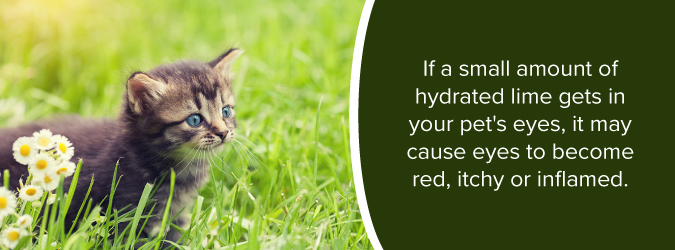
If a small amount of hydrated lime gets in your pet’s eyes, it may cause eyes to become red, itchy or inflamed. Larger amounts may cause significant problems — we’re talking chemical burns or even blindness.
Lungs, Nose and Throat
Because lime can be such an irritating substance, it goes without saying that it can be dangerous for pets exposed to large amounts of lime dust. Breathing in powdered lime can cause burning in the nose and throat, as well as more severe damage to the lungs and esophagus.
Dogs are known for their uncanny ability to go sniffing around where they sometimes shouldn’t — and any excess lime around your yard poses a risk.
Immediately after exposure, make sure your pet is in a space with plenty of fresh air. Observe your pet closely to see if behavior seems off — think labored breathing, drooling, lethargy, vomiting or diarrhea. When in doubt, call the vet or consult the ASPCA Animal Poison Control hotline if you think lime has caused any harm to pets.
Skin and Paw Pad Dermatitis
Non-caustic powdered lime will likely cause some mild irritation should it come into contact with the skin. Hydrated lime, on the other hand, may cause pets to develop dermatitis — itching, rash and dehydrated skin.
Paw pads are at risk, too. Though paw pads are made from a thicker skin that can withstand more damage to heat or harsh materials, that doesn’t mean they were built to prevent lime burns. Chemical irritants, in general, may lead to some serious injuries.
Chemical burns, especially when left unattended, can result in cell death, as they erode skin and paws.
Though treatment is dependent on the extent of the burns, the prognosis is typically good for most pets. It’s just a good idea to get them to the vet.
A quick check up is needed to determine whether lime has been absorbed into the system and whether surgery or medication is required to prevent infections and get hurt pets healing right away.
A Word About Hydrated Lime
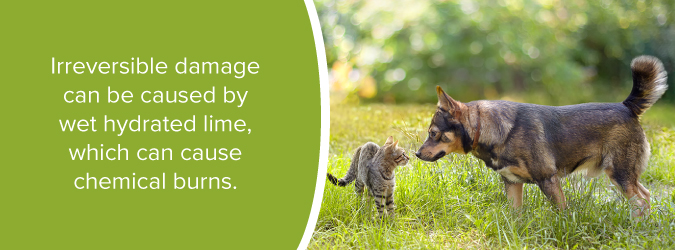
Irreversible damage can be caused by wet hydrated lime, which can cause chemical burns. Burns to the mouth, throat, stomach and digestive tract can occur if ingested. We’d strongly suggest avoiding hydrated lime for home applications — it’s tricky to avoid big messes, and failure to clean up properly may cause major damage to people and pets.
When dry hydrated lime comes into contact with moist parts of the body or with water, a chemical reaction takes place, causing severe damage.
Caustic burns can cause irreversible damage to pets’ skin and paws — in some cases third-degree burns. If you have pets or children that play in your yard, stay away from hydrated lime unless you’ve hired a professional up to the task.
Is Lime Safe For Dogs?
Lime is much safer than other types of fertilizer, but it should never be ingested. However, sometimes things happen. No matter how careful you thought you were, there’s always a chance a few pellets slip under the radar. Or a chance that some powdered lime didn’t quite get washed away as planned.
If you think (or know) that your dog has ingested lime pellets or powder, it’s wise to get them to the vet, stat.
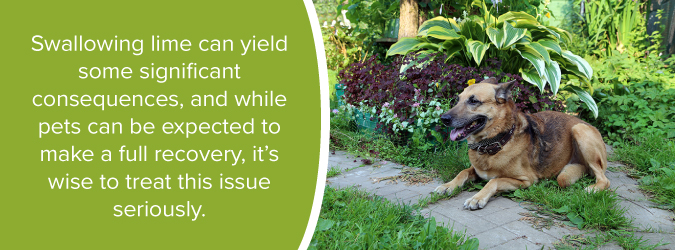
Swallowing lime can yield some significant consequences, and while pets can be expected to make a full recovery, it’s wise to treat this issue seriously — as lime poisoning in dogs side effects can range from mild digestive comfort to more severe problems.
Ingesting lime may lead to digestive woes like constipation, upset stomach and more. Lime is rich in calcium oxide — and eating it may lead to a condition known as hypercalcemia.
What to Do If Your Dog Ate Lime Fertilizer?
If you’re wondering if lime is bad for dogs, the answer is yes. Let’s face it dogs will eat just about anything — for better or worse. So, naturally, you know you need to take some precautions when it comes to everything from the plants you choose to add to your garden to the fertilizers used to help them flourish.
How to Clean Lime off of Your Pet
If your pet gets into a pile of lime, you should try your best to clean them off. Remember, lime can cause severe burns if not handled correctly. Again, water can make lime more “active,” so go against your gut feelings and don’t immediately try to rinse your pet off with water — especially if they’ve been exposed to hydrated lime.
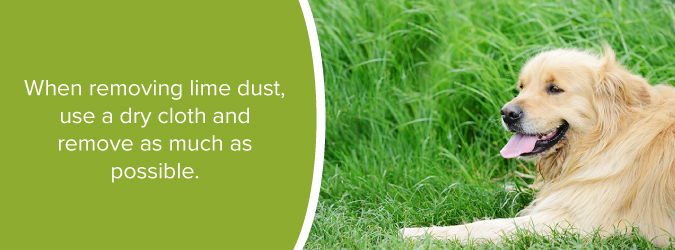
When removing lime dust, use a dry cloth and remove as much as possible. Gently check paw pads for traces of the substance, and gently wipe in between each pad.
How to Apply Lime Safely
Although we know you’d choose your pet, you don’t have to sacrifice your garden’s aesthetics to keep your furry friends around for the long haul. However, you do need to be a little careful — for your sake, too. Here are some safety tips for ways you can spread lime safely:
Protect Your Skin
First things first — no matter what type of lime you choose to apply to your lawn, you’ll want to be dressed for the job.
Proper clothing includes closed toe shoes — think comfy hiking boots or leather work boots for maximum protection. Sneakers should be okay but avoid wearing those with ventilation or grommets on the side — which may open up the potential for lime to reach the skin.
You’ll also want to cover up the rest of your body. Long pants and long sleeves are a must for lime application, while gloves, goggles and masks that cover your nose and mouth will provide additional protection against lime irritation.
While all this suiting up may seem like a lot of steps for the casual lawn owner, but lime has some adverse effects — albeit not toxic — like skin irritation and more.
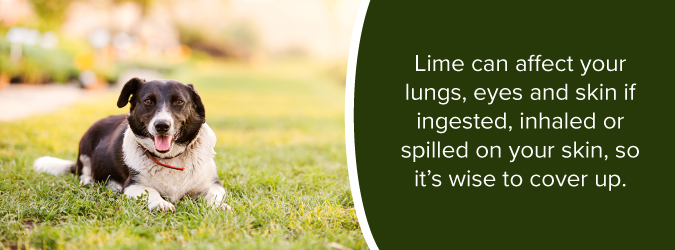
Lime can affect your lungs, eyes and skin if ingested, inhaled or spilled on your skin, so it’s wise to cover up more than you think you need.
Use a Spreading Tool to Minimize Harm to Pets
In addition to covering your body, you’ll want to consider how you approach lime application — weighing safety concerns against convenience and ease. Using a spreader can help keep things contained, applying lime to all the right spots.
Now, there are a couple of different options for spreading lime over your lawn. Here’s a quick look:
- Rotary Spreader: One way to apply lime is by using a tool known as a rotary spreader. This approach allows the users to spread the lime to large swaths of lawn quickly.By throwing the pelletized lime in a broad pattern, the rotary spreader covers more ground in less time.It gets the job done in short order — making sure you’ve got plenty of time for walking your sweet pets after tending to your lawn.
- Apply Lime with a Drop Spreader: A drop spreader, your other option, works to disperse pelleted lime along as you push the tool. This method may work better for people with smaller lawns, as the drop spreader essentially drops the pellets directly below the opening. You’ll want to be thorough, making sure you pass over the entire garden.Compared to the rotary spreader, drop spreading seems a bit tedious, but it may provide a more precise application. While using a drop spreader allows you to apply a correct amount of lime onto the lawn, it also requires many more laps around the lawn to apply the lime.
- Water Thoroughly After Lime Application: Watering your lawn after liming is more than just a safety precaution. Water is the essential part of the lime fertilizer equation, ensuring the lime does its job. Lime must be absorbed into the soil for it to have an effect of the overall pH level in the surrounding areas.
- Tow spreader: For larger gardens and lawns, a tow spreader that can be pulled behind a tractor or other agricultural vehicle lets you cover a lot of ground when laying down lime.
- Self-propelled spreader: This spreader type works well for large or industrial farming operations, offering bigger tank capacities with more advanced spreading technology.
Use Gypsum
While lime pellets are safer for pets, gypsum is the safest alternative for lime. Gypsum is a natural neutralizer that’s nontoxic to humans, pets, soil and plants. If your pet consumes or breathes in gypsum for a short period, like when playing in the yard, they should be okay. However, breathing in or ingesting large amounts of it or experiencing prolonged exposure may cause similar complications to lime, including a blocked gastrointestinal tract.
The only difference between gypsum and lime is that gypsum does not have a pH-increasing effect. If your soil is acidic, lime pellets are still the best option.
Considering Applying Lime to Your Yard? Check out Baker Lime
While we understand the value of a pristine green lawn, taking care of your loved ones — both four-legged and two — takes precedence over perfection.
However, in the case of lime, you can have your lawn and make sure it’s safe, too.
Again, while lime is considered safe, it’s a good idea to follow the recommended safety precautions specifically. Pets, kids and adults can safely coexist in a lime-treated environment, just keep in mind, you don’t want to handle any lime powder directly.
At Baker Lime, we’ve been in the lime business since 1889 — so it’s fair to say we’ve racked up a decent amount of expertise. From Ag lime to pelletized dolomite lime, we’ve got everything you need to keep your lawn — or entire farm growing for the long term.
Serving New York, New Jersey, Pennsylvania, Delaware and both Virginias, we provide bulk lime right where you need it. Request a quote from your local dealer today!
Related Resource





